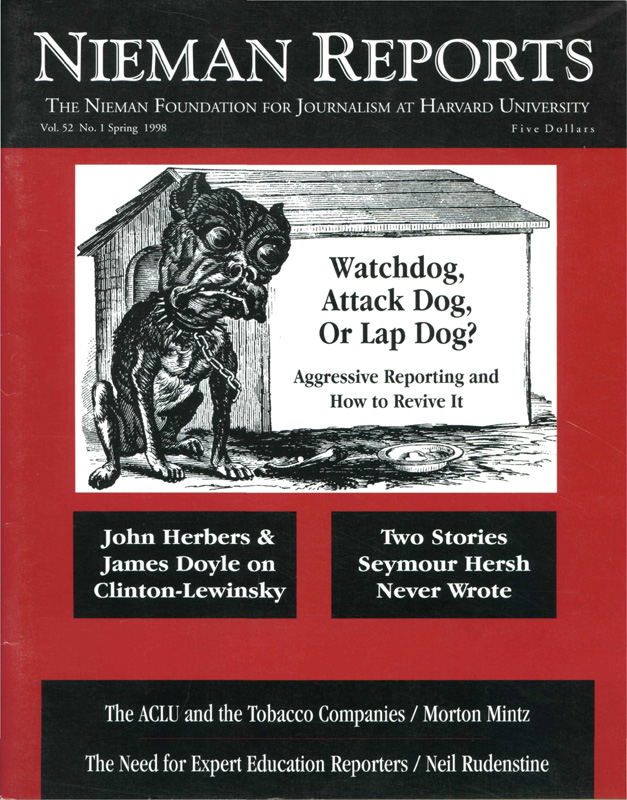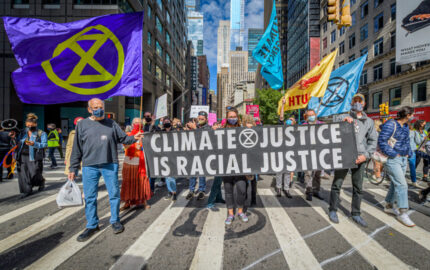
Watchdog, Attack Dog, or Lapdog?
This issue on Watchdog Journalism originated with a call by Murrey Marder, the retired Washington Post Diplomatic Correspondent, for a return to more aggressive, but responsible, reporting. The package begins with two articles on the media's handling of the accusations that President Clinton had an improper sexual relationship with Monica S. Lewinsky. Excerpts from a seminar by Seymour Hersh, the Pulitzer Prize-winning investigative reporter, follow. Then we offer position papers on the status of watchdog journalism in four areas—the economic sector, state and local government, national security and nonprofit organizations.
Once upon a time I thought, along with Richard Parker, that "watchdog" journalism equaled "muckraking," which would lead to "making America better." Indeed, when Richard recruited me to help him with Motherjones magazine in the mid-'70's, it was because we shared an "alternative" notion of journalism: anti-war, anti-authoritarian, anti-establishment. In terms of watching the economy, we would serve the interests of democracy by dogging the footsteps of those who ran it—the rich and powerful. Thus would we prevent them from abusing their position to the detriment of the common weal.
To the extent that we, and those like us, were at all successful, it was probably because of what Richard now calls "narrative frames." That is, our readers, like those of the Muckraking Era, shared a set of stories about the crises of the culture and how they could be resolved: in our case, about "imperialist" wars like Vietnam, about racial and gender inequality, about the abuses of corporate capitalism, large and small. And, of course, about the kinds of reforms necessary to make America better. Muckraking was a kind of crusade: in exposing the dirt, we were well on our way to cleaning things up (though I don't remember having Ida Tarbell or Lincoln Steffens in mind).
In the quarter century since, the frames have grown fuzzier. The reasons are various, but one effect seems clear: crusading journalism has less impact these days. In Richard's terms, perhaps: liberating the Holy Land is a harder story to sell. Or, to put it another way, the more you rake, the more muck you seem to expose.
That's not to say the project has been abandoned. As Richard points out, there's no obvious shortage of well-versed watchdogs, in the traditional sense, keeping an eye on, and sometimes raking over, the world of business and economics. In what we used to call the "straight" press, these topics seem to receive more attention than ever. On the alternative front, MotherJones persists and thrives; so, for that matter, does The Nation.
But if, as Richard suggests, the goal of a journalist is to nurture democracy by improving life in America (instead of, say, simply to make a decent living doing really cool work), what's a watchdog to do these days?
Richard's tentative answer is to try to discover "new narratives" by asking Americans what they consider fair, what changes they'd like to see, "what sorts and features of benefits.. .they need to give themselves real security."
I've asked an awful lot of Americans questions of that kind in the last 20-plus years. Their answers are best summarized by what a liberal congressman once told me, when asked how it felt to represent The People: "The People are no bargain. They want everything, but they don't want to pay for it."
One of Richard's proposed questions is: "If four out of five Americans consider corporate CEO's overcompen-sated, what do they think is the alternative?" Well, how do you think four out of five Americans would respond? My own guess: "CEO's should make less—way less." (The 20 percent would probably say CEO's earn their fair market value—the same 20 percent, I'd imagine, who've made almost all the economic gains since 1973; they might even be the same 20 percent whose interest spurs the vast media commitment to stock market and other investment news.)
Let me not be cynical here. Richard isn't plugging for a poll or survey, with one-sentence (much less yes-or-no) answers. He wants to strike up a dialogue, I infer; create new narrative frames by getting a conversation started; avoid the dead-end of raking muck for muck's sake. Maybe it's a good idea. You can't change the world if you don't learn how it really works. Since the ways of business and economics are, like everything else, best learned by doing, it might make sense to induce The People to do something: to grapple with the cost/benefit tradeoffs of everyday life. Ask them tough questions. In responding, they'll be learning by doing. And providing the watchdog journalist with the threads of new stories ("narratives").
My own approach is a bit different, however. With Richard, I continue to think a journalist's job has something to do with bolstering democracy. But rather than asking basic business and economic questions of the audience, I ask them on behalf of the audience.
The purpose is to demystify—"Toto Journalism," if you want to keep the canine metaphor alive. Trying, that is, to be the watchdog who pulls the curtain on the Glorious Oz, as opposed to the pit bull intent on tearing the wizard limb from limb. (Or interviewing the Munchkins on how they think they might try to become a little taller.)
No, that's the wrong tone to take. I don't mean to disparage pit bulls (muck-rakers) or those who might go Richard's painstaking dialogue route. 1 admire anyone who could do such things. It's just that in a world of so much information, so little understanding, I feel getting back to basics is a job well worth doing. In terms of democracy, the idea is to empower the people by teaching them. In the process, new narratives might well emerge.
 Paul Solman is Business Correspondent for public television's "The NewsHour with Jim Lehrer."
Paul Solman is Business Correspondent for public television's "The NewsHour with Jim Lehrer."
To the extent that we, and those like us, were at all successful, it was probably because of what Richard now calls "narrative frames." That is, our readers, like those of the Muckraking Era, shared a set of stories about the crises of the culture and how they could be resolved: in our case, about "imperialist" wars like Vietnam, about racial and gender inequality, about the abuses of corporate capitalism, large and small. And, of course, about the kinds of reforms necessary to make America better. Muckraking was a kind of crusade: in exposing the dirt, we were well on our way to cleaning things up (though I don't remember having Ida Tarbell or Lincoln Steffens in mind).
In the quarter century since, the frames have grown fuzzier. The reasons are various, but one effect seems clear: crusading journalism has less impact these days. In Richard's terms, perhaps: liberating the Holy Land is a harder story to sell. Or, to put it another way, the more you rake, the more muck you seem to expose.
That's not to say the project has been abandoned. As Richard points out, there's no obvious shortage of well-versed watchdogs, in the traditional sense, keeping an eye on, and sometimes raking over, the world of business and economics. In what we used to call the "straight" press, these topics seem to receive more attention than ever. On the alternative front, MotherJones persists and thrives; so, for that matter, does The Nation.
But if, as Richard suggests, the goal of a journalist is to nurture democracy by improving life in America (instead of, say, simply to make a decent living doing really cool work), what's a watchdog to do these days?
Richard's tentative answer is to try to discover "new narratives" by asking Americans what they consider fair, what changes they'd like to see, "what sorts and features of benefits.. .they need to give themselves real security."
I've asked an awful lot of Americans questions of that kind in the last 20-plus years. Their answers are best summarized by what a liberal congressman once told me, when asked how it felt to represent The People: "The People are no bargain. They want everything, but they don't want to pay for it."
One of Richard's proposed questions is: "If four out of five Americans consider corporate CEO's overcompen-sated, what do they think is the alternative?" Well, how do you think four out of five Americans would respond? My own guess: "CEO's should make less—way less." (The 20 percent would probably say CEO's earn their fair market value—the same 20 percent, I'd imagine, who've made almost all the economic gains since 1973; they might even be the same 20 percent whose interest spurs the vast media commitment to stock market and other investment news.)
Let me not be cynical here. Richard isn't plugging for a poll or survey, with one-sentence (much less yes-or-no) answers. He wants to strike up a dialogue, I infer; create new narrative frames by getting a conversation started; avoid the dead-end of raking muck for muck's sake. Maybe it's a good idea. You can't change the world if you don't learn how it really works. Since the ways of business and economics are, like everything else, best learned by doing, it might make sense to induce The People to do something: to grapple with the cost/benefit tradeoffs of everyday life. Ask them tough questions. In responding, they'll be learning by doing. And providing the watchdog journalist with the threads of new stories ("narratives").
My own approach is a bit different, however. With Richard, I continue to think a journalist's job has something to do with bolstering democracy. But rather than asking basic business and economic questions of the audience, I ask them on behalf of the audience.
The purpose is to demystify—"Toto Journalism," if you want to keep the canine metaphor alive. Trying, that is, to be the watchdog who pulls the curtain on the Glorious Oz, as opposed to the pit bull intent on tearing the wizard limb from limb. (Or interviewing the Munchkins on how they think they might try to become a little taller.)
No, that's the wrong tone to take. I don't mean to disparage pit bulls (muck-rakers) or those who might go Richard's painstaking dialogue route. 1 admire anyone who could do such things. It's just that in a world of so much information, so little understanding, I feel getting back to basics is a job well worth doing. In terms of democracy, the idea is to empower the people by teaching them. In the process, new narratives might well emerge.
 Paul Solman is Business Correspondent for public television's "The NewsHour with Jim Lehrer."
Paul Solman is Business Correspondent for public television's "The NewsHour with Jim Lehrer."


